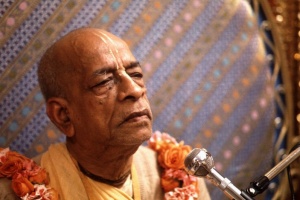SB 4.3.11: Difference between revisions
No edit summary |
(Vanibot #0054 edit - transform synonyms into clickable links, which search similar occurrences) |
||
| Line 23: | Line 23: | ||
<div class="synonyms"> | <div class="synonyms"> | ||
''tvayi'' | ''[//vanipedia.org/wiki/Special:VaniSearch?s=tvayi&tab=syno_o&ds=1 tvayi]'' — in you; ''[//vanipedia.org/wiki/Special:VaniSearch?s=etat&tab=syno_o&ds=1 etat]'' — this; ''[//vanipedia.org/wiki/Special:VaniSearch?s=āścaryam&tab=syno_o&ds=1 āścaryam]'' — wonderful; ''[//vanipedia.org/wiki/Special:VaniSearch?s=aja&tab=syno_o&ds=1 aja]'' — O Lord Śiva; ''[//vanipedia.org/wiki/Special:VaniSearch?s=ātma&tab=syno_o&ds=1 ātma]-[//vanipedia.org/wiki/Special:VaniSearch?s=māyayā&tab=syno_o&ds=1 māyayā]'' — by the external energy of the Supreme Lord; ''[//vanipedia.org/wiki/Special:VaniSearch?s=vinirmitam&tab=syno_o&ds=1 vinirmitam]'' — created; ''[//vanipedia.org/wiki/Special:VaniSearch?s=bhāti&tab=syno_o&ds=1 bhāti]'' — appears; ''[//vanipedia.org/wiki/Special:VaniSearch?s=guṇa&tab=syno_o&ds=1 guṇa]-[//vanipedia.org/wiki/Special:VaniSearch?s=traya&tab=syno_o&ds=1 traya]-[//vanipedia.org/wiki/Special:VaniSearch?s=ātmakam&tab=syno_o&ds=1 ātmakam]'' — being an interaction of the three modes of material nature; ''[//vanipedia.org/wiki/Special:VaniSearch?s=tathā&tab=syno_o&ds=1 tathā] [//vanipedia.org/wiki/Special:VaniSearch?s=api&tab=syno_o&ds=1 api]'' — even so; ''[//vanipedia.org/wiki/Special:VaniSearch?s=aham&tab=syno_o&ds=1 aham]'' — I; ''[//vanipedia.org/wiki/Special:VaniSearch?s=yoṣit&tab=syno_o&ds=1 yoṣit]'' — woman; ''[//vanipedia.org/wiki/Special:VaniSearch?s=atattva&tab=syno_o&ds=1 atattva]-[//vanipedia.org/wiki/Special:VaniSearch?s=vit&tab=syno_o&ds=1 vit]'' — not conversant with the truth; ''[//vanipedia.org/wiki/Special:VaniSearch?s=ca&tab=syno_o&ds=1 ca]'' — and; ''[//vanipedia.org/wiki/Special:VaniSearch?s=te&tab=syno_o&ds=1 te]'' — your; ''[//vanipedia.org/wiki/Special:VaniSearch?s=dīnā&tab=syno_o&ds=1 dīnā]'' — poor; ''[//vanipedia.org/wiki/Special:VaniSearch?s=didṛkṣe&tab=syno_o&ds=1 didṛkṣe]'' — I wish to see; ''[//vanipedia.org/wiki/Special:VaniSearch?s=bhava&tab=syno_o&ds=1 bhava]'' — O Lord Śiva; ''[//vanipedia.org/wiki/Special:VaniSearch?s=me&tab=syno_o&ds=1 me]'' — my; ''[//vanipedia.org/wiki/Special:VaniSearch?s=bhava&tab=syno_o&ds=1 bhava]-[//vanipedia.org/wiki/Special:VaniSearch?s=kṣitim&tab=syno_o&ds=1 kṣitim]'' — place of birth. | ||
</div> | </div> | ||
Latest revision as of 21:48, 18 February 2024

A.C. Bhaktivedanta Swami Prabhupada
TEXT 11
- tvayy etad āścaryam ajātma-māyayā
- vinirmitaṁ bhāti guṇa-trayātmakam
- tathāpy ahaṁ yoṣid atattva-vic ca te
- dīnā didṛkṣe bhava me bhava-kṣitim
SYNONYMS
tvayi — in you; etat — this; āścaryam — wonderful; aja — O Lord Śiva; ātma-māyayā — by the external energy of the Supreme Lord; vinirmitam — created; bhāti — appears; guṇa-traya-ātmakam — being an interaction of the three modes of material nature; tathā api — even so; aham — I; yoṣit — woman; atattva-vit — not conversant with the truth; ca — and; te — your; dīnā — poor; didṛkṣe — I wish to see; bhava — O Lord Śiva; me — my; bhava-kṣitim — place of birth.
TRANSLATION
This manifested cosmos is a wonderful creation of the interaction of the three material modes, or the external energy of the Supreme Lord. This truth is fully known to you. Yet I am but a poor woman, and, as you know, I am not conversant with the truth. Therefore I wish to see my birthplace once more.
PURPORT
Dākṣāyaṇī, Sati, knew very well that her husband, Lord Śiva, was not very much interested in the glaring manifestation of the material world, which is caused by the interaction of the three modes of nature. Therefore she addressed her husband as aja, which refers to one who has transcended the bondage of birth and death, or one who has realized his eternal position. She stated, "The illusion of accepting the perverted reflection, the material or cosmic manifestation, to be real is not present in you, because you are self-realized. For you the attraction of social life and the consideration that someone is father, someone is mother and someone is sister, which are illusory relationships, is already over; but because I am a poor woman, I am not so advanced in transcendental realization. Therefore naturally these appear to me as real." Only less intelligent persons accept this perverted reflection of the spiritual world to be real. Those who are under the spell of the external energy accept this manifestation to be fact, whereas those who are advanced in spiritual realization know that it is illusion. Actual reality is elsewhere, in the spiritual world. "But as far as I am concerned," Sati said, "I do not have much knowledge about self-realization. I am poor because I do not know the actual facts. I am attracted by my birthplace, and I want to see it." One who has attraction for his birthplace, for his body, and for other such items mentioned in the Śrīmad-Bhāgavatam is considered to be like an ass or a cow. Satī might have heard all this many times from her husband, Lord Śiva, but because she was a woman, yoṣit, she still hankered after the same material objects of affection. The word yoṣit means "one who is enjoyed." Therefore woman is called yoṣit. In spiritual advancement, association with yoṣit is always restricted because if one is like a play doll in the hands of yoṣit, then all his spiritual advancement is at once stopped. It is said, "Those who are just like playthings in the hands of a woman (yoṣit-krīḍā-mṛgeṣu) cannot make any advancement in spiritual realization."